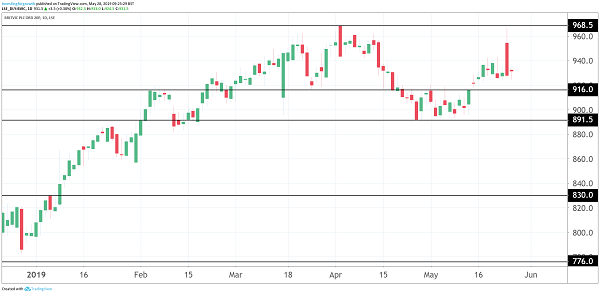Stockwatch: Euro elections make this one a 'keeper'
This mid-cap has been a great tip for our companies analyst who expects further buying opportunities.
28th May 2019 10:11
by Edmond Jackson from interactive investor
This mid-cap has been a great tip for our companies analyst who expects further buying opportunities.

Amid heightened uncertainty over international trade and now a hard Brexit, if not general election, it is timely to review a favourite "defensive" stock in Britvic (LSE:BVIC).
I first backed the drinks company two years ago at 575p, suggesting an inflation point operationally and in terms of market sentiment. Last January at 858p I reiterated scope for Britvic to become a premium global brand in low/no sugar drinks amid a trend to supplant both alcohol and sugar – so rated the shares as 'Add'. An investment programme (nearing completion) should also deliver further earnings upgrades.
On a macro view, I also suggested defensive stocks should be kept in focus given a divided parliament meant "Britain will anyway not leave the EU on 29 March, increasingly likely is a long messy disruptive path to a second referendum – or even worse for equity investors, a general election where a discredited/in-fighting Tory party gets replaced by a radical left-wing government, prompting capital flight."
With Tory knives already out for leadership favourite Boris Johnson, and the prospect of any other "no deal Brexit" prime minister voted down by parliament, triggering a general election, it’s hardly pessimistic to keep this scenario in mind.
Sterling has held up pretty well, if increasingly exposed to fractious politics gnawing at the country's economic performance. Britvic's growth in overseas markets – 37.5% of group revenue according to latest interims to 14 April – helps mitigate this.
In response to latest interims, the stock regained its recent all-time high above 960p, then drifted last Friday to close at 930p. Among brokers, Citigroup, Goldman, Numis, RBC and Shore Capital have ‘neutral’ to ‘hold’ stances, with the market price modestly ahead of their targets. Investec has upgraded from 875p to 1,025p and UBS from 920p to 1,010p, these two advising 'buy'.

Source: TradingView Past performance is not a guide to future performance
Cash flow measures exceed earnings' valuation
Last week's half-year results show modest all-round growth with profit figures up around 5% on organic revenue up 1.9% at constant currency or 4.9% on a reported basis – the overseas markets translating usefully.
Adjusted earnings per share (EPS) and the interim dividend also rise 5%, although some observers consider the stock fully- if not over-valued on a prospective price/earnings (PE) ratio in the high teens and yielding 3.3%, based on consensus forecasts as of 13 April (see table).
See from the table, however, that cash flow measures are consistently ahead of earnings, albeit with substantial capital expenditure since 2016, the likely reason dividends haven’t expanded significantly further.
A potential industry buyer would take the view that cash flow per share likely in the region of 70p and higher brings this valuation multiple down to 13 times or better, with financial performance set to benefit as the group comes off a capex hump.
I haven't seen the rationale from Investec or UBS, but this is why I'd side with their targeting a stock value of over 1,000p.
Admittedly, the interim cash flow statement shows net cash from operations down from £26.2 million to £15.5 million on a like-for-like basis, albeit due to a £46.9 million decrease in trade and other payables, versus a £16 million like-for-like increase. This could be seen as an exceptional factor in an otherwise robust cash flow profile.
With private placement notes also being paid down, £86.2 million cash was absorbed by financing activities which together with £32.6 million applied for investment (offset by £15.5 million net cash flow from operations) meant a £103.3 million net decrease in cash. The 14 April 2019 interim balance sheet cites this at just £6.4 million.
Notes to the accounts also cite the interim cash outflow driven "in part by the timing of our working capital cycle, as our normal seasonal peak naturally occurs at half year" and increased stock in case of a no-deal Brexit (be aware, means additional warehousing costs).
| Britvic - financial summary | Consensus estimates | ||||||
|---|---|---|---|---|---|---|---|
| Year ending 30 Sep | 2014 | 2015 | 2016 | 2017 | 2018 | 2019 | 2020 |
| re-stated | |||||||
| Turnover (£ million) | 1344 | 1300 | 1431 | 1431 | 1503 | ||
| IFRS3 pre-tax profit (£m) | 120 | 138 | 152 | 139 | 146 | ||
| Normalised pre-tax profit (£m) | 136 | 148 | 152 | 138 | 160 | 185 | 199 |
| Operating margin (%) | 11.9 | 13.2 | 12.1 | 10.2 | 11.0 | ||
| IFRS3 earnings/share (p) | 36.2 | 41.2 | 43.5 | 42.2 | 44.1 | ||
| Normalised earnings/share (p) | 42.7 | 45.3 | 43.6 | 41.8 | 56.3 | 59.3 | 63.5 |
| Earnings per share growth (%) | 9.3 | 6.1 | -3.7 | -4.2 | 34.7 | 5.3 | 7.2 |
| Price/earnings multiple (x) | 16.5 | 15.7 | 14.6 | ||||
| Annual average historic P/E (x) | 17.4 | 16.4 | 14.6 | 15.8 | 17.1 | 13.1 | |
| Cash flow/share (p) | 49.8 | 58.4 | 42.9 | 67.7 | |||
| Capex/share (p) | 23.3 | 22.9 | 44.0 | 49.0 | |||
| Dividend per share (p) | 20.9 | 21.5 | 23.3 | 26.5 | 28.2 | 29.6 | 31.8 |
| Yield (%) | 3.0 | 3.2 | 3.4 | ||||
| Covered by earnings (x) | 2.0 | 2.2 | 1.9 | 1.6 | 2.0 | 2.0 | 2 |
| Net tangible assets per share (p) | -87.8 | -35.7 | -52.1 | -43.9 | -23.6 | ||
| Source: Company REFS | |||||||
Investment "underpins long-term growth"
Looking forward, the completion of Britvic's "transformational business capability programme" is said to support growth "and a material improvement in cash generation."
Work at its London and Leeds sites concluded in 2018 and Rugby is due to this year – resulting in three new can lines, an automated warehouse and combined heat/power plant. Production of Robinsons and Fruit Shoot will transfer from a Norwich site which will close.
The resulting three-site network is heralded as more efficient, cutting road miles and accelerating response to consumer trends by expanding the range of liquids and pack sizes offered.
In terms of financing, however, you could criticise a 14% rise in net debt to £654 million (adjusted down from £705.1 million excluding derivative hedges) for helping to pay dividends, not just cope with seasonal peaks and the investment programme, though it looks chiefly a stop-gap measure.
Innovation boosts consumer attraction in the UK
Potentially, growth could rise towards double-digit rates with benefit also from currency translation if Brexit weakens sterling further.
Britvic is also positioned well for social trends, for instance in low/no sugar drinks as people also moderate or cut out alcohol now medical advice cautions about cancer risks.
Management says the UK soft drinks levy has helped attract consumers to its products with J20, Spritz and Fruit Shoot achieving growth alongside Robinsons’ innovation in new premium ranges.
I confess a personal interest, drinking Robinsons Real Fruit squash to rehydrate after a summer run. Unlike fresh fruit juice it doesn't need consuming in three days once open (I’d prefer a whole orange anyway) and perhaps squash is evocative of youth.
Yes, the supermarkets may offer cheaper own-brands, but Robinsons' fruit blends still make you feel a bit like a Wimbledon contestant given the brand’s 85 years' sponsorship of the tennis tournament. In 2015, Robinsons enjoyed a double-digit sales uplift following its Wimbledon campaign.
International narrative is quite mixed
France has seen interim revenue ease 5.8% to £125.3 million at constant exchange rates "as we have focused on ensuring an acceptable margin for the overall business", with private label drinks revenue lower; meanwhile new innovations are being launched.
Similarly, revenue eased 0.9% to £90.6 million in Ireland linked to third-party alcohol brands in the wholesale trade, while low/no sugar variants in Pepsi and Miwadi (an Irish soft drink owned by Britvic) saw growth offset by falls in their regular products – a situation now stabilised.
Brazil has enjoyed 8% growth to £66.1 million as brand investment continues including promotions and campaigns.
Elsewhere internationally, "strong revenue growth was achieved across all the sub-channels" e.g. via a stronger distribution platform in Benelux markets, new account wins in travel and export channels, and US growth in Fruit Shoot multi-pack revenue helped by greater presence in Walmart (NYSE:WMT) – hence other "international" revenues up 20.2% to £24 million.
So, while the story on international operations reads quite mixed, there do not appear to be any genuine setbacks, and prospects seem overall good.
In a worse-case scenario of UK recession, I doubt this would dent food and drink demand though could require sponsoring price offers (thus ceding margin) to limit switching to cheaper supermarket brands.
Based on reported figures, operating margins were around 7% in the first half of 2019, the same as in 2018, and 8% for the last financial year, although Company REFS takes a more generous view of 11%. Whichever, it allows some comfort.
Market volatility could continue to offer buying opportunities and intrinsically I retain my stance: Add.
Edmond Jackson is a freelance contributor and not a direct employee of interactive investor.
These articles are provided for information purposes only. Occasionally, an opinion about whether to buy or sell a specific investment may be provided by third parties. The content is not intended to be a personal recommendation to buy or sell any financial instrument or product, or to adopt any investment strategy as it is not provided based on an assessment of your investing knowledge and experience, your financial situation or your investment objectives. The value of your investments, and the income derived from them, may go down as well as up. You may not get back all the money that you invest. The investments referred to in this article may not be suitable for all investors, and if in doubt, an investor should seek advice from a qualified investment adviser.
Full performance can be found on the company or index summary page on the interactive investor website. Simply click on the company's or index name highlighted in the article.
Disclosure
We use a combination of fundamental and technical analysis in forming our view as to the valuation and prospects of an investment. Where relevant we have set out those particular matters we think are important in the above article, but further detail can be found here.
Please note that our article on this investment should not be considered to be a regular publication.
Details of all recommendations issued by ii during the previous 12-month period can be found here.
ii adheres to a strict code of conduct. Contributors may hold shares or have other interests in companies included in these portfolios, which could create a conflict of interests. Contributors intending to write about any financial instruments in which they have an interest are required to disclose such interest to ii and in the article itself. ii will at all times consider whether such interest impairs the objectivity of the recommendation.
In addition, individuals involved in the production of investment articles are subject to a personal account dealing restriction, which prevents them from placing a transaction in the specified instrument(s) for a period before and for five working days after such publication. This is to avoid personal interests conflicting with the interests of the recipients of those investment articles.